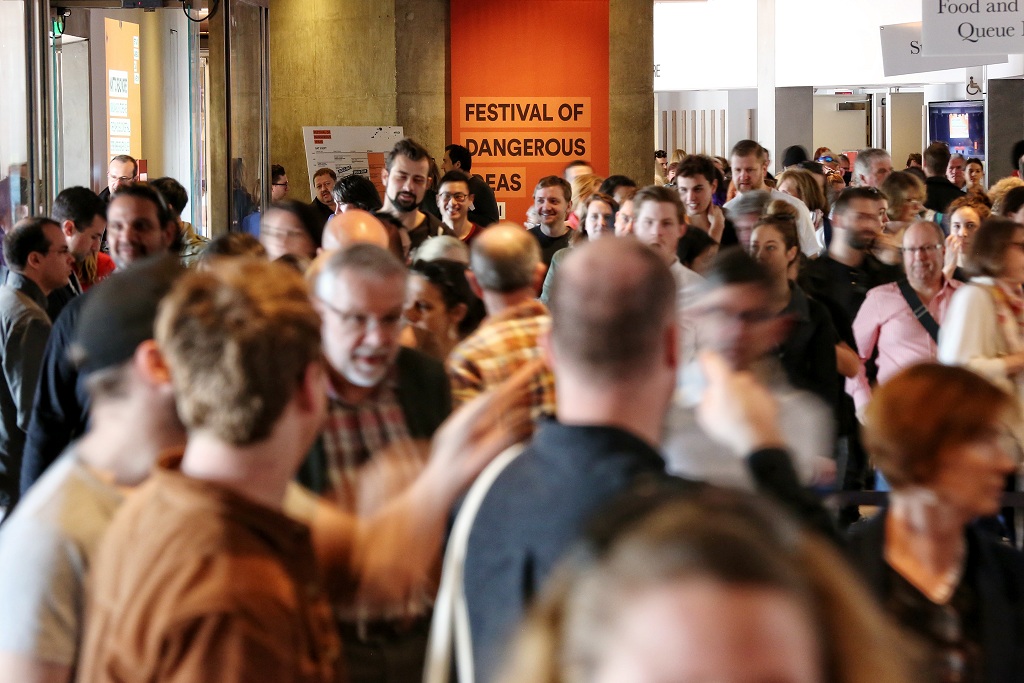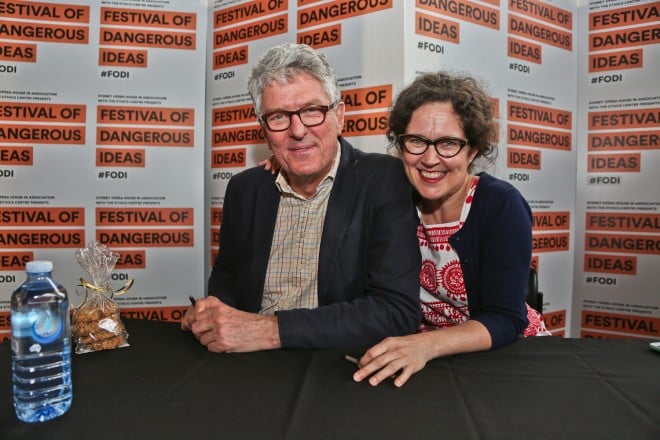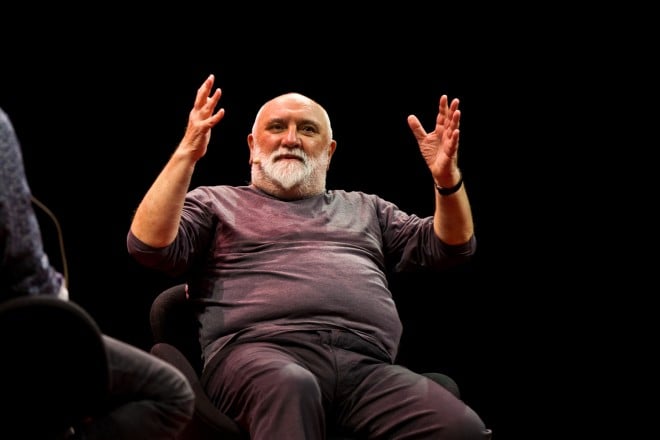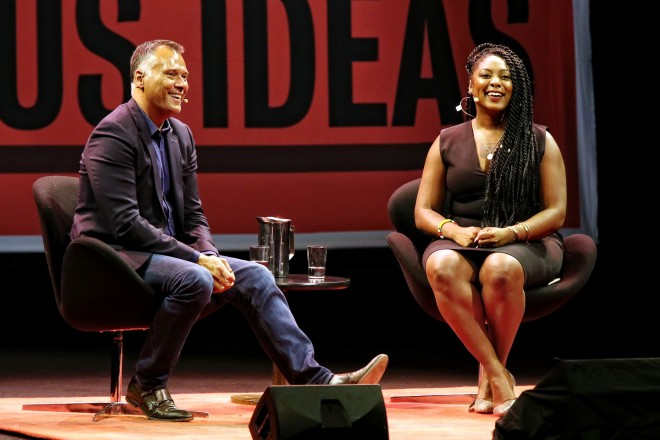Not A Lot Of Danger, But Definitely Some Ideas: A Weekend At The Festival Of Dangerous Ideas
Black Lives Matter, the decay in Australian politics and Marxist comedians. Is this Australia's most provocative festival?

What makes an idea dangerous? I don’t know for sure, but if it’s being to shared to a packed out audience at the Sydney Opera House consisting primarily of property investors from Annadale, there’s a pretty strong chance there won’t be much danger around.
This review isn’t another cynical takedown of the Festival of Dangerous Ideas (FODI). There’s enough of that on Twitter. But since the festival describes itself as an exploration of “a dark and dangerous landscape with conversations about death, dirty politics, disappearing countries and disruptive behaviour”, the name of the event and the expectations it sets warrant some kind of examination.
Roses are red
Water is flavourless
The ideas at your festival
Aren't really that dangerous— some media guy (@axmcc) September 3, 2016
But before we get there, there’s lots of good things to talk about! Every event I attended at the festival, with the exception of the self-trolling exercise that was Andrew Bolt’s talk, was genuinely interesting and very positively received by the audience. It’s pretty clear the festival’s organisers have a deep understanding of their audience profile and a good nose for curating relevant topics.
I Spent An Hour Playing Right-Wing Bingo With Andrew Bolt And It Was Predictably Awful
–
Annabell Crabb vs. David Marr
One of the most surreal moments I’ve ever experienced was sitting in the Opera House’s massive Concert Hall and absorbing the rockstar welcome Annabel Crabb and David Marr received. The pair are like catnip to an audience of upper middle-class progressives and the ‘in conversation’ style event was essentially an opportunity for them to joke with one another and share various political anecdotes. But as much as the audience loved it, I found it one of the least engaging events of the weekend.

Sorry mates. (Credit: Yaya Stempler)
I think there were a few reasons for this. Both Crabb and Marr are incredibly prolific writers and commentators. They both have a knack for digesting political machinery into something easily accessible to time-poor political watchers. But the problem with being prolific is that you’re everywhere, all of the time. And by the time it came to watching them at FODI I felt I knew their thoughts on federal politics, Malcolm Turnbull and Bill Shorten inside out. Maybe that says more about me than the event, but I didn’t walk away feeling like I’d learnt something new, which was a big contrast to other events.
The Crabb-Marr talk was the key political discussion of the festival and in one way I think it was a missed opportunity. The event was titled ‘The government we deserve?’ and was introduced as an exploration of Australia’s highly unstable political landscape. But there’s a problem with investigating the decay of Australian politics and examining the challenges facing our political class through the lens of commentators like Crabb and Marr. And that’s the fact that they themselves are virtually members of that same class. Crabb in particular relies heavily on personal relationships with politicians and political staff in order derive insights and write her style of ‘political sketches’. The problem isn’t that the insights are boring or factually incorrect, it’s that they come from the same sphere as the subjects being analysed.
When we’re at a point where trust in politicians and the media is at record lows, it would have been more interesting, and dare I say dangerous, to hear the perspectives of outsiders. What do young writers, artists and thinkers outside the political sphere, who are regularly screwed over by the system, think about the nature of Australia’s politics? Such an event might have been less bankable for the festival than the crowd-pulling lure of Marr and Crabb, but I think it would have been more interesting.
–
Turns Out Marxists Can Be Really Funny
The festival wasn’t all a serious analysis of heavy ideas and politics. Alexei Sayle, the avant-garde proponent of Britain’s alternative comedy scene in the 1980s, was there to help make sure we all had fun too.
His talk, ‘Thatcher Made Me Laugh’ was another sell-out and had the audiences in stitches. Even though Sayle hasn’t really been considered revolutionary for 30 years, the fact he was the only festival speaker to openly identify as a communist automatically made him one of the most interesting and dangerous.

The fact he was on The Young Ones helped too. (Credit: Yaya Stempler)
He also laid some pretty excellent burns on Stephen Fry, Hugh Laurie, people who like the EU, everyone who’s rich and, of course, Margaret Thatcher. His session convinced me to buy a copy of his book for my dad, who is a massive fan of old-school British comedy, which was convenient since it was Father’s Day. Thanks FODI!
–
“Why Black Lives Matter”
To me, the clear highlight of the weekend was the keynote speech delivered by Alicia Garza, one of the founder’s of the Black Lives Matter movement in the US. Her event with Australian journalist Stan Grant was titled ‘Why Black Lives Matter’ which drew a subtle jibe from Grant, who suggested that the topic wasn’t something that should be considered remotely dangerous.

[Awkward laughter] (Credit: Prudence Upton)
Her critiques of prison and affirmative action (according to Garza it “overwhelmingly benefits white women” more than any other group) clearly made the audience feel uncomfortable at times, but that’s exactly what an event like FODI should be doing. The event was received very positively but it also challenged the audience on some of our prejudices and beliefs. It helped us understand why a broader critique of the way society works is needed if we want to fight something as oppressive as racism.
Garza’s talk was powerful and moving, but it felt like an exception. While the other talks were interesting and funny, Garza and Grant genuinely provoked. An event consisting entirely of people of colour was also a refreshing and a welcome change from Sydney’s usual white bread cultural scene. It stood in stark contrast, for example, to the ‘Crisis Without Borders’ event that discussed the challenge of refugee flows and global people movements without featuring a single refugee or migrant.
If FODI wants to live up to its name and drive the discussion around provocative and potentially dangerous ideas it needs more Garza and less of the same mainstream political commentary we can read in every newspaper and listen to at every other literary festival.
–
Feature image credit: Prudence Upton